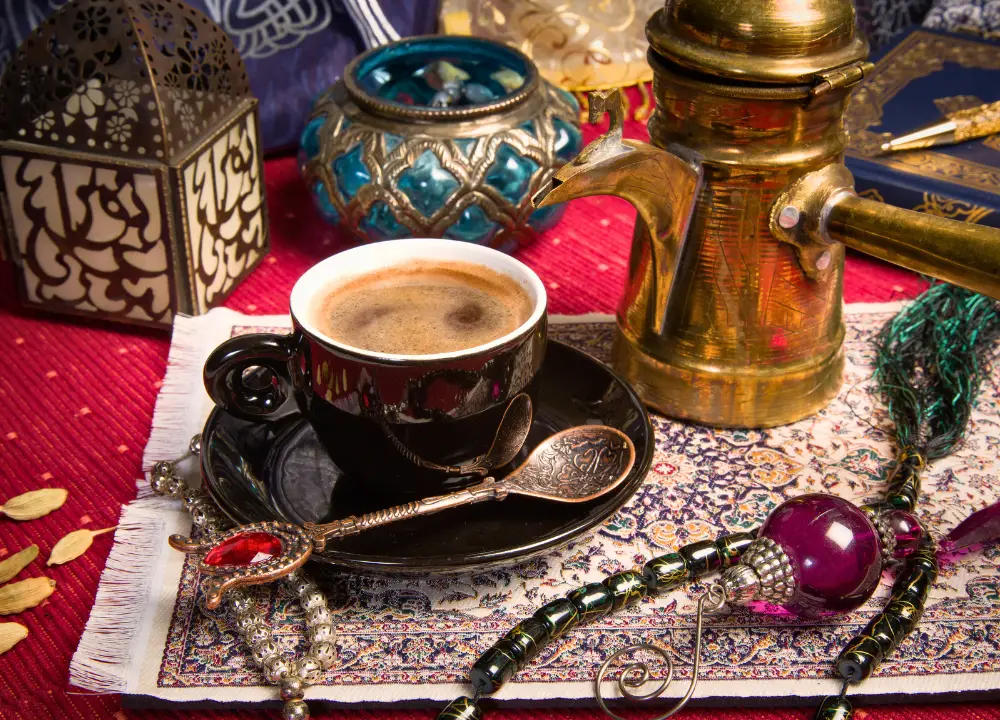The history of Jordanian coffee dates back centuries, influenced by various cultures that have passed through the region. This drink often features a blend of spices and the finest beans, creating a unique taste experience.
Table of Contents
What Is Jordanian Coffee?
Jordanian coffee is more than just a beverage; it is a symbol of hospitality and tradition. This coffee reflects the rich culture and history of Jordan. It connects people through shared moments and cherished rituals.
The Origins Of Coffee In Jordan
The story of coffee in Jordan dates back centuries. It is believed that coffee originated in the Arabian Peninsula. Traders brought coffee beans to the region. Over time, Jordan embraced this beverage, making it a part of its culture.
Key points about the origins of coffee in Jordan:
- Coffee spread from Yemen to Jordan in the 15th century.
- It became popular among the Bedouins and urban dwellers alike.
- Jordanian coffee is often brewed using a special method.
- It is typically flavored with cardamom, enhancing its taste.
Historically, coffee houses became social hubs. People gathered to enjoy coffee, share stories, and discuss important matters. These gatherings strengthened community bonds. Today, Jordanian coffee remains a vital part of social life.
Here is a simple table showing the types of coffee commonly found in Jordan:
| Type of Coffee | Flavor Profile |
|---|---|
| Arabic Coffee | Spicy, rich, and aromatic |
| Turkish Coffee | Strong, thick, and bold |
| Bedouin Coffee | Lightly sweet with cardamom |
The Influence Of Bedouin Traditions On Jordanian Coffee
Bedouin traditions play a significant role in shaping Jordanian coffee culture. The Bedouins are known for their warm hospitality. Offering coffee to guests is a cherished custom. This practice shows respect and friendship.
Here are some key aspects of Bedouin coffee traditions:
- Bedouins often brew coffee over an open flame.
- They use a special coffee pot called a “dallah.”
- Serving coffee is a ritual, often accompanied by dates.
- Guests are served three cups, symbolizing respect.
The preparation of coffee is an art. It requires patience and skill. Each cup reflects the care taken in its making. The aroma of brewing coffee fills the air, creating a welcoming atmosphere. This tradition continues to thrive in Jordan today.
Bedouin coffee ceremonies emphasize community and connection. They bring people together, creating lasting memories. This rich tradition keeps the spirit of Jordanian hospitality alive.
Jordanian Coffee Culture And Traditions
The rich traditions of Jordanian coffee culture add depth to social gatherings. Understanding these traditions helps us appreciate the importance of coffee in Jordan.
The Role Of Coffee In Jordanian Hospitality
Coffee plays a vital role in Jordanian hospitality. It is a welcoming gesture to offer coffee to guests. This tradition reflects warmth and respect. When entering a Jordanian home, guests can expect a cup of coffee as a sign of welcome.
Here are some key aspects of coffee in Jordanian hospitality:
- Offering Coffee: The host serves coffee to show generosity.
- Sharing Stories: Coffee time is for sharing stories and laughter.
- Strengthening Bonds: Coffee helps build and strengthen relationships.
Serving coffee is often accompanied by specific customs:
| Action | Meaning |
|---|---|
| Pouring with the right hand | Shows respect and care. |
| Filling the cup half full | Indicates hospitality without overwhelming the guest. |
| Refilling the cup | Sign of good friendship and appreciation. |
In Jordan, coffee is not just a drink. It is a way to connect with others. The act of serving coffee creates a bond, making every gathering special.

Symbolism And Rituals In Serving Jordanian Coffee
The process of serving coffee in Jordan is full of meaning. Every step carries significance. The rituals reflect respect and tradition.
When serving coffee, specific symbols are present:
- Arabian Dallah: A traditional coffee pot used to brew and serve coffee.
- Colors: The coffee’s color symbolizes richness and quality.
- Perfumed Spices: Cardamom and other spices enhance the flavor and aroma.
Rituals during coffee service include:
- First, the host brews the coffee with care.
- Then, they pour the coffee into small cups.
- Finally, they serve the guests in a specific order.
Guests often perform their own rituals in response:
- Accepting the cup: A gesture of gratitude.
- Drinking three cups: A sign of appreciation and respect.
These rituals enhance the experience. They create a deep connection between the host and the guest. Coffee becomes a bridge of understanding and friendship.
Understanding Jordanian Coffee Flavors
Jordanian coffee offers a unique taste that reflects its rich culture and history. Understanding Jordanian coffee flavors reveals the heart of this tradition.
Flavor Notes And Unique Additives In Jordanian Coffee
Jordanian coffee has distinctive flavor notes that set it apart from other coffee styles. The primary flavors include:
- Nutty – A rich, earthy taste that brings warmth.
- Spicy – A hint of spice that adds depth.
- Floral – Some coffees have a delicate floral aroma.
These flavors come from the beans and unique additives. Jordanian coffee is often brewed with:
- Cardamom – A key ingredient that enhances the taste.
- Sugar – Added for sweetness, often in varying amounts.
- Rose water – Occasionally used for a fragrant touch.
Here’s a table summarizing common flavor profiles in Jordanian coffee:
| Flavor Profile | Description |
|---|---|
| Nutty | Rich and warm, creating a comforting taste. |
| Spicy | Hints of cardamom and other spices for depth. |
| Floral | A light, fragrant note that elevates the aroma. |
The balance of these flavors creates a memorable coffee experience. Each cup reflects the traditions and love put into brewing.
Cardamom As A Signature Ingredient
Cardamom plays a vital role in Jordanian coffee. It is not just an additive; it is a signature ingredient. This spice is known for its strong aroma and unique flavor. It brings warmth and complexity to the coffee.
Using cardamom dates back centuries. It symbolizes hospitality and tradition in Jordan. Here are key points about cardamom in Jordanian coffee:
- Enhances Flavor: Cardamom adds a spicy note that complements the coffee.
- Health Benefits: It offers digestive benefits and has anti-inflammatory properties.
- Cultural Significance: Cardamom is often used in special occasions and gatherings.
Brewing coffee with cardamom requires specific methods. Here’s a simple process:
- Roast the coffee beans with cardamom pods.
- Grind them together for a consistent mix.
- Boil water and brew the mixture.
- Strain and serve hot, often with sugar.
Cardamom not only flavors the coffee but also makes it a cultural experience. It connects people through shared rituals and traditions.
Best Coffee Beans From Jordan
Among the best coffee beans from Jordan, Al Ameed Coffee stands out. Known for its quality and taste, Al Ameed offers a variety of blends that cater to different preferences.
Al Ameed Coffee
The story of Al-Ameed Coffee begins in 1973. It started with a passion for quality Arabica beans. Today, Al Ameed Coffee is a household name in Jordan. Their coffee blends are famous for their rich flavors and inviting aromas. Al Ameed offers three main blends, each with its own unique taste:
- Light Blend: Smooth and gentle flavor. Perfect for a subtle experience.
- Medium Blend: Balanced taste with a hint of cardamom. Great for everyday drinking.
- Dark Blend: Rich and bold flavor. Ideal for those who enjoy a stronger coffee.
Each blend uses high-quality beans combined with cardamom. This spice adds a unique twist. The coffee is roasted to perfection, enhancing its natural flavors.

Brewing Authentic Jordanian Coffee
Brewing authentic Jordanian coffee connects people. It brings families together and shows respect to guests. The process of making this coffee is an art. It reflects the heart of Jordan.
Traditional Brewing Equipment And Techniques
To brew authentic Jordanian coffee, specific equipment is essential. Each item plays a key role in the brewing process. The traditional method involves a few important pieces:
- Jebena: This is a special pot for brewing coffee. It is often made of brass or clay.
- Finjan: A small cup used for serving coffee. It helps control the amount served.
- Mortar and Pestle: Used for grinding the coffee beans. Freshly ground coffee enhances flavor.
- Hot Sand: Sometimes used to heat the jebena evenly.
Each piece of equipment has its own significance. The jebena is vital for brewing the coffee. Heat is essential, and hot sand helps maintain the right temperature. The mortar and pestle ensure the coffee is ground well. This process preserves the coffee’s natural oils and flavors.
| Equipment | Function |
|---|---|
| Jebena | Brewing pot for coffee |
| Finjan | Serves the coffee |
| Mortar and Pestle | Grinds coffee beans |
| Hot Sand | Heats the jebena |
This traditional brewing method makes Jordanian coffee unique. It reflects the love and care taken in every cup.
Step-by-step Guide To Making Jordanian Coffee
Making Jordanian coffee involves simple steps. Follow this guide for an authentic experience:
- Gather your ingredients: You need freshly roasted coffee beans, water, and sugar (optional).
- Grind the beans: Use a mortar and pestle. Aim for a fine powder for the best flavor.
- Boil water: Fill the jebena with water. Place it on the heat source, or hot sand.
- Add coffee: Once the water is hot, add the ground coffee. Stir gently.
- Simmer: Allow the coffee to simmer for a few minutes. Watch for bubbles to form.
- Pour and serve: Gently pour the coffee into the finjan. Add sugar if desired.
Enjoy your coffee slowly. Savor the rich flavors and aromas. This experience is about more than just the drink. It’s about sharing moments with friends and family.

